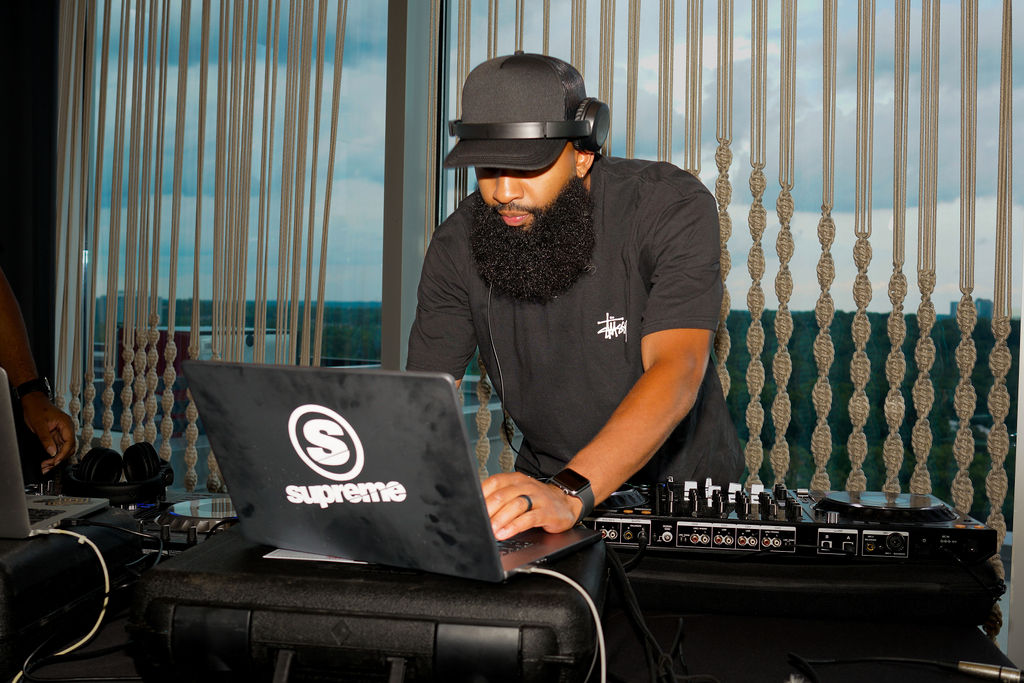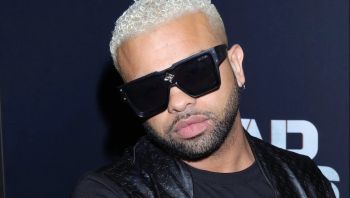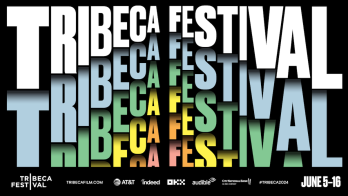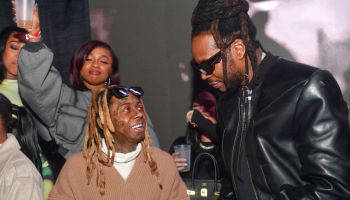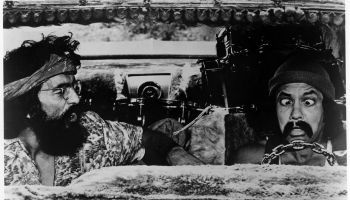Marc Ecko‘s name can be paralleled with a multitude of images, logos, companies and power moves, but at the gut and the skin of Marc Ecko is a self-made lucrative brand created from the cliched ground up.
Now, after multiple decades in the blinding spotlight throughout the good, the bad, the success and the hangovers of failure, Marc Ecko has put his gray hair to work to produce the first book of its kind from the man behind the brand; the Marc we never got to know.
UNLABEL, Selling You Without Selling Out, is the color and graphic bursting textbook that we all desired, brought to fruition. The book is a success story, riddled with the bruising mistakes and the contrasting triumphs of Marc’s journey.
The book doesn’t officially drop until October 1st, but we had the opportunity to catch up with the brand genius and pick his brain on everything from tattoos to Breaking Bad and Kanye West. It’s a wild ride riddled with brand building gems and pop culture commentary, but it’s clear that one chat with Mark will change your paradigm.
Check out the interview below.
GlobalGrind: Why this topic, why this book and why now?
Marc Ecko: It is something that I have been wanting to do for 5 years or so. When I sold my operating interest in my brand, I became really reflective of everything I was going through and went through. I felt a desire to put my gray hair to work a little bit and teach. It is kind of one of those things that you make fun of when you’re younger, it’s like some old man shit. The “why now” is because it took this long to do it and get it to a place that I was content with the final transcript and the content.
When you were coming into the game there was no Twitter, there was no social media. Now, people are using these social media platforms to build their brands, but they aren’t really doing anything with the brand. Like, ‘Oh you’re the funny guy on Twitter, or you’re the sexy girl on Instagram with 10k followers.’ What do you think about these people who establish the social brands and do nothing with it?
I think those are celebrity trolls. I think there is a goal and a purpose when it comes to using it as a tool set, especially with social media, but you need not be defined by it. The end measure cannot be quantified or qualifying what all of that means as a currency and I think one of the trappings of being a ‘celebrity’ on social media is that you find yourself working like a gerbil on a wheel and it is hard to qualify and quantify it as a currency. You have to be very careful to not get caught up managing a resource and disproportionality playing the perceived part of what your brand is; that’s what a lot of the book talks about. There is the internal brand, guts to the skin, and then there is the brand that we perceive, skin to the world, and that is the hardest one, because people will criticize that. They will be cynical and you work so hard to play that ‘perception is reality’ game when in fact, reality is reality.
When it comes to social media, the consequence of over-investing in that as a medium in order to bluster up your brand is that you might inadvertently be playing house, and rather than having your brand defined by what you do, by what you make, by how you make people feel, you’re having it defined by how you are perceived. As a value proposition long term, that is not a great foundation for building a brand. A brand is like a deep, deep well; you go there and you’re thirsty as a motherfucker and that shit is always filled. People who are caught up in the ‘perception is reality’ game aren’t refilling that well.
In the opening of your book, you dedicate the book to your wife and your kids. If you wanted your kids to take away one core message from this book, what would it be?
When you boil down this book, and my philosophies in business and in life, as a parent and a manager and collaborator, is you have to focus on your goalkeepers and not your gatekeepers. The core theme in this book is if you’re focused with wanting to design a solution, a scheme or a product that openly appeals to the gatekeeper, you lose sight of your goals. We see this in life with trying to comply with testing systems, universities, having that right degree or that right thing on your resume. If in life if you only set out to comply with that gatekeeper, you lose sight of building your own brand. It’s like who are you building it or, them or you? And what is defining that compliance metric? Who is defining the rules? You or them?
That’s a key thing. I see it in my kids now, my daughter is 11 and human beings are just mean motherfuckers. They’re just mean and cynical and honestly, in the pit of desperation to say “hey, I’m an individual,” they’re all herding together. They all claim they are black sheep, but they are just herding up like black sheep all together.
I see it now with my daughter, I try to remind her. I will say “what is your goal this year” and she will say it and I will ask her “what are the things you need to do to reach that goal,” And it’s so funny that even at a young age, they exhibit signs of the goal being long term and even though it’s a little naïve and she can’t articulate it like a big kid, it is bigger than those little kids that are giving you a hard time.
The point is to focus on the goalkeeper and not the gatekeeper. I have seen it on the come up early on, my competitors and friends and peers where honestly, if we are going to be intellectually honest, they were consumed by what the gatekeepers thought. They had to fit in and these are people that were often talented and really deserving of massive amounts of success, but they were almost too afraid to succeed. Like ‘If I step a little out of the box they are going to look down their noses on me; can I handle that?’ In order to build your brand you have to, because you can’t look like everybody else.
What do you consider a sell-out? What is your definitive definition?
I think when you compromise your intention. Intention isn’t a destination; it is an expression of where you are at life. Your intention when you’re 19 isn’t your intention at 39 years old. Intentions are formed by the need to adapt and evolve. My intention was always to be known for my art.
Authenticity is a work of progress too. There were times where I was really authentic, and there were instances where I was inauthentic. And the brand kinda stretches and turns and I had to deal with the consequences of that, and in the book I was very honest about that. Too often we wave that sellout flag, but you have to use it carefully, because it is one thing to say someone is compromising their intentions, but just because someone is trying to win it doesn’t automatically make them a sell-out. Do you remember Justin Timberlake in N*SYNC versus Justin Timberlake in Vanguard awards? Let’s remember. But does that make him bad? No. His intention was to be a pop star.
If you woke up tomorrow and you were Marc Ecko without an artistic inclination, what would you be doing?
I would be a sad motherfucker. I can’t even comprehend that. It is unfathomable. If you god forbid couldn’t use your hands tomorrow is the real question. God forbid I couldn’t use my hands. That is a very scary idea, but I think I would just be most happy being expressive.
If you put your name in a Google image search, do you understand how many tattoos of rhinos and the cut and sew logos come up? How do you feel when you see someone with your brand tattooed on their body?
Honestly, sometimes bad. I think the culture of the times have made it where tattoos are a great accessory, so it depends on the point of view on those things. I think it is a very permanent commitment. But I am flattered and I am hype that people are so into the history of the brand. I think the real Ecko heads who know the history of the brand from when I was making T-shirts in my garage.
Do you remember the first time you saw someone with your logo tattooed on them?
Yeah, I do. It was when my office was in New Brunswick, New Jersey on Jersey Avenue and a dude came in, I forget exactly who he was, and he was like “Yo peep.” That was like a year and a half after the rhino was marketed and I was blown away by that. I am like, ‘are you sure about that?’ But I think people also assign different meanings [to the logo] which is cool. People sometimes project a meaning onto your brand and make it their own, and most of the time I feel bad because I hope I don’t disappoint them and I hope I can live up to that.
When you’re not brand building, are there any shows that you are binge watching?
Breaking Bad. I am on the bandwagon, I am not going to front. I am on the fucking Breaking Bad bandwagon. I am on it. I was just like, everybody talks about it. What a diverse array of people that talk about it , and I put that shit on and by episode 3 I was like, “shut up!”
**Later on in the conversation after a lengthy discussion about the state of streetwear brands and urban wear, Marc delved into the topic of balancing what is creatively gratifying and what is commercially marketable. The conversation led us to Kanye West and his impeccable balance of the two:
You have to balance on one hand, what is creatively gratifying for you, and on the other hand what is commercially responsible, so you can be sustainable.
If you only focus on what is creatively gratifying, you may be that motherfucker in an ivy tower making art nobody would ever see and, you may be very alone. Don’t get it twisted, someone like a Kanye who is a master at being able to balance those things, there is an art and a gamesmanship that he maneuvers, however calculated or not. Don’t get it twisted when he says “I’m the Steve Jobs of hip-hop,” when I hear that I am kind of like, ‘no you’re not. You are the Kanye of hip-hop; dude, just be you.’ What, because you’re a micro-manager? I don’t get that metaphor. I get the desire to show that ‘my work has a massive influence,’ but don’t get it twisted, he also has a mass influence because there was a degree of balancing the creative intent and the commercial responsibility. That product works well in concerts, it works well for songs and commercials, it works well for a lot of things. Let’s be honest about it.
